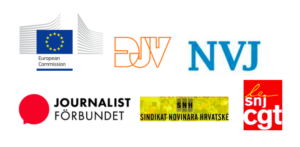Germany: Health and safety training for journalists in Bonn

Eleven journalists and representatives from regional journalists’ unions in Germany took part in a training workshop on the health and safety of journalists in Bonn on September 14-15 2022. This workshop is the first in a series of training sessions organised by the European Federation of Journalists (EFJ) as part of the Safety4Journalists project.
The workshop was organised by EFJ and its member the German Federation of Journalists (DJV). It focused on specific safety needs for journalists in Germany, including covering protests safely, online harassment and trolling.
It responds to the increasing attacks facing journalists in Germany with the aim to equip them with practical safety advice. In the last six months alone, 66 attacks against journalists have been recorded according to the Media Freedom Rapid Response (MFRR). These attacks included physical attacks, hate speech, and online assaults.
The Bonn workshop explored some of these prevention techniques and also gave the opportunity for the participants to share their experiences on the threats and attacks they face when doing their work.
Peter ter Velde, former journalist and project manager at PersVeilig delivered the first training session on how to safely report during protests. Participants learned how to prepare for covering protests, how to behave and report news facing hostile crowds including practical scenario exercises
In addition to the training workshop, the EFJ and the DJV organised a roundtable for the participants to discuss further actions to develop a national safety culture in Germany. Participants were also told about the Dutch platform PersVeilig, a joint initiative of the NVJ, the Dutch Association of Editors in Chief, the Police and the Public Prosecution Service. The platform aims to strengthen the position of journalists against violence and aggression on the street, on social media and against legal claims.
The second day focused on online threats and harassment. Online safety editor Rebecca Whittington and digital safety expert Ela Stapley delivered the training session.
Dr Whittington trained participants on how to respond to backlash, doxxing and direct and indirect threats. She discussed some practical guidelines, including available support for journalists in Germany and Europe. The participants were also given the opportunity to explore various case studies in small groups. Stapley then walked through steps that journalists should take in order to protect themselves online concerning their profiles, passwords, and more.
The next workshop of the Safety4Journalists project will be held in November in Croatia.
This article is contributed by Andrea Roth, EFJ Steering Committee member and DJV Chair, and Ute Korinth, resilience trainer and journalist







